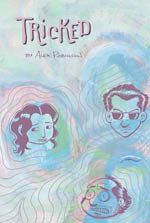Comics /
Comic Reviews /
More Comics
ALEX ROBINSON: TRICKED
By Leroy Douresseaux
November 16, 2005 - 16:13
Alex Robinson has a new book out –
TRICKED, and what is does in terms of format and content is very important, or should be to people who claim to be interested in things that are important to both the medium and the industry.
Over the last two decades, the writers of
The Comics Journal, the only magazine to take comics seriously as an art form rather than as a medium of cheap entertainment, have argued that comic books could tell the same kinds of stories that films, television, novels, etc could – that being straight drama. Did we, however, ever really believe that there would be a time when comic book writers and artists would create the kind of stories we see in movies such as
How to Lose a Guy in 10 Days or
American Beauty? Would someone create a comic book that was like the film,
Short Cuts? Would the medium ever see comic books and graphic novels that tackled the subject matter of such books as
Beloved,
The Corrections, or
Rabbit Redux?
In their own inimitable fashion comic books have already tackled complex and involved issues, and we’ve seen that in such comic books and graphic novels as Peter Bagge’s
Hate, Kyle Baker’s
Nat Turner Chester Brown’s
Louis Riel Gilbert Hernandez’s
Blood of Palomar and
Love and Rockets X, Carla Speed-McNeil’s
Finder, Alan Moore’s unfinished
Big Numbers, and of course, Art Spiegelman’s
Maus.
So Alex Robinson’s TRICKED should come as no surprise. Robinson is well known for his breakthrough graphic novel,
Box Office Poison, which has brought him varied praise and big awards. What makes
Tricked different from the previously mentioned comic book works is that the publisher, the superb
Top Shelf Productions, published Tricked immediately in book form. Tricked was not serialized, as many great “graphic novels” have been. A reader can only get Tricked as one big book, sold as a novel just like a real book – say, something by Tom Clancy, Stephen King, or Terry McMillan.
Tricked isn’t so much about the lives of people as it follows the lives of six people who are eventually connected by an act of violence. There’s
Ray Beam, a reclusive rock legend and Tricked’s lead character, if the book has one.
Nick is a counterfeiter and leads multiples secret lives – none of which his wife and daughter know.
Phoebe is the lost daughter, who wants to finally meet her biological father, but she must meet him secretly, as her mother is determined they never meet.
Steve is an obsessive-compulsive crank, and he’s stopped taking his medicines, which causes his mind to slowly detach from reality.
Caprice is a heartbroken waitress; her boyfriends toss her aside after they’ve used her, and each one likes to remind Caprice that she is overweight.
Lily takes a job with Ray Beam, and begins a whirlwind romance with him, also unwittingly becoming his muse.
As a work of storytelling, Tricked is problematic. Many of the connections between the characters are contrived, and granted that creating fictional relationships is, in a sense, a contrivance. However, these fictional relationships should have a feel of naturalism, and Tricked’s connections don’t. Not all the characters are that engaging. For instance, Phoebe barely registers in the sub-plot devoted to her plight. The drama in her storyline actually belongs to her father, his partner, and the people who work for him. She’s literally an invisible woman.
Nick, a slick, but sometimes clumsy pathological liar deserves, a book all to himself. Every time Robinson leaves him, Tricked loses momentum. The Ray-Lily affair comes across like something from a mediocre Hollywood romance. That which is most interesting about Ray (his drug addictions, his career as a musician, his art, his relationship with his manager and his personal assistant) is frustratingly hidden behind his relationship with Lily. Steve is also very interesting, but his ultimate fate is to be the object of a pedestrian storytelling twist (even if it gives this tale its most shocking moment).
Sometimes while reading this, I got that feeling that Robinson can create complicated and complex characters, but he can’t deal with them. Thus, Ray’s issues (as well as that of most all the other characters) are window dressing. Robinson’s breezy, conversational dialogue is an easy out. It’s a joy to read, but it keeps the characters shallow, although they are, by his design, honestly not.
In the final analysis, however, I think history will judge this book for what it is rather than for the execution of the plot and concept. This is a true-to-life drama – you know, realism. Fans have been describing the stories in Marvel Comics as realistic for decades, but there is nothing in superhero comics that is as realistic as Tricked. With this book, Alex Robinson has told the kind of story that other mediums – let’s call them mainstream entertainment mediums – do all the time. Tricked may not be great art, but it is a great effort. The comics industry needs this more than it needs
Infinite Crisis or
House of M. This is the kind of book that can bring comics into the mainstream. Cheers to Robinson and Top Shelf.
Mr. Charlie #73 reminds you that you can pick up Tricked and other Alex Robinson books directly from the publisher, http://www.topshelfcomix.com/
For a look at my movie reviews, try
NEGROMANCER.
Last Updated: January 17, 2025 - 08:20
